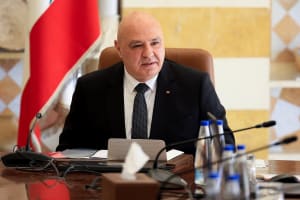Former Biden envoy criticizes Israel’s ‘muscular’ approach in Lebanon as IDF prepares for new escalation
Hezbollah said to rearm faster than Lebanese army and IDF strikes are degrading it

The White House envoy for Lebanon under the previous Biden administration, Amos Hochstein, criticized Israel’s increasing airstrikes amid Hezbollah’s push to restore its military capabilities on Tuesday.
Speaking with On the Record with Hadley Gamble, Hochstein, who had mediated the ceasefire in Lebanon last year, said Israel “needs to understand that the muscular approach, and the more pressure … sometimes gets to a point of diminishing returns and [becomes] counterproductive.”
Hochstein argued that Hezbollah is weakened politically but still a force to be reckoned with. “The country doesn't want them. The way I would define it is they're too weak to fight Israel, but they're strong enough to fight Lebanon. So, I agree with the position of a gradual disarming of Hezbollah … But don't put the kind of pressure on the system that breaks it and leads us to a civil war.”
The comments came against the background of increasing Israeli airstrikes against the terror group in the past weeks, as well as numerous warnings by experts and Israeli officials that Hezbollah is increasing the pace of its rearmament effort, despite the Lebanese government’s commitment to disarm the group.
“The Americans’ patience has run out – there is an atmosphere of pre-war in Lebanon. If Israel stops its strikes in Lebanon, we will see Hezbollah on our border within less than a week,” warns Col. (res.) Dr. Jacques Neriah, a former senior officer in IDF intelligence and a Lebanon expert at the Jerusalem Center for Foreign Policy and Security.
He added that Israel’s sporadic strikes are not enough to curb Hezbollah’s resurgence. “It is necessary to intensify and strike Hezbollah’s command centers,” he concluded.

The U.S. has been pressuring the Lebanese government to fulfill its commitment to disarm Hezbollah, but the efforts of the Lebanese Armed Forces (LAF) have been dragging out while being outpaced by Hezbollah’s rearmament drive.
Senior Israeli military officials told Haaretz that this could cause Israel to expand its operations in Lebanon, potentially triggering another large-scale escalation.
However, the officials also noted that Hezbollah’s rebuilding efforts are focused on areas north of the Litani River, and not on Israel’s border.
Lebanese sources, meanwhile, emphasized to Reuters that the LAF is doing all it can do and has run out of the explosives needed to blow up Hezbollah infrastructure.
Security sources said the military doesn’t even have its own intelligence to find Hezbollah weapons caches and is dependent on Israeli intelligence transmitted through the ceasefire monitoring mechanism.
Notably, the sources said that already by late May of this year, the LAF had received so many reports from the IDF that it had struggled to conduct the necessary raids.
However, the same report said that in September, only nine new caches had been discovered. Nevertheless, the LAF reportedly expects to finish its sweep of southern Lebanon south of the Litani by the end of the year.
On Sept. 5, the Lebanese cabinet reportedly approved a plan to establish the state’s monopoly on weapons, and the disarmament of all other groups, starting in the south and gradually moving north and east.
While the south is supposed to be cleared by the end of the year, there was no clear timeline for the north and the east, which includes the Bekaa Valley, Hezbollah’s central node for weapons smuggling and production.
While the LAF is relatively busy raiding single figures of unmanned weapons caches per month, Israeli security officials told Haaretz that the military is avoiding any direct confrontations with Hezbollah fighters and is barely acting to prevent it from rebuilding.
Retired IDF colonel and security expert, Kobi Marom, wrote on Channel 12 News that “the Lebanese Army has been operating, destroying infrastructure, tunnels and bunkers in southern Lebanon; it has also carried out activity in refugee camps against Palestinian infrastructure, but it is not arresting Hezbollah members nor confiscating weapons.”
Marom further explained that “the Lebanese Army is a weak army, with limited capabilities, with manpower that is small for its missions. In addition, about 30% of the soldiers and commanders are from the Shiite community, which creates a problem in confronting Hezbollah. There is also a lack of willingness at this stage to create a direct confrontation with Hezbollah.”
The Lebanese government has recently indicated that it will wait for Israel to end its airstrikes before continuing with the disarmament plan.
Hezbollah, meanwhile, has rejected the disarmament plan completely. The group sent a written statement to Reuters, acknowledging that, according to the ceasefire’s terms, the LAF would take responsibility for the area south of the Litani, but “The rest depends on a political settlement, which we don’t yet have. The army is betting on time.”
On Wednesday, the Hezbollah-affiliated Al-Akhbar newspaper reported that the U.S. continues to pressure Lebanon to open direct negotiations with Israel for a security arrangement and rejected its proposals to convert the ceasefire monitoring mechanism into an indirect forum for talks.
According to the report, the U.S. is using the threat of escalated IDF strikes to pressure Lebanon toward disarming Hezbollah, reportedly making it clear that it won’t discourage Israel from striking in Lebanon.

The All Israel News Staff is a team of journalists in Israel.
You might also like to read this:

















